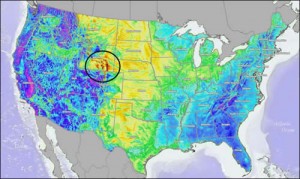As California and other states zoom toward getting 50% of their energy from renewable resources like solar and wind, there’s no question that we’ll need a bigger geographic grid footprint to balance these sources. We can’t rely solely on these in-state, intermittent resources without driving up rates and firing up backup fossil plants to compensate for their variable production.
An expanded grid addresses that problem (along with energy storage and demand response) and provides economic benefits to boot. It means, for example, that California can sell its excess surplus power in the spring and fall to other states, while we can import solar from Arizona in the morning or wind from Wyoming at other times.
That’s why California’s grid operator — the Independent System Operator (CAISO) — is so gung ho on purchasing the neighboring PacifiCorp, which operates in six western states. As Utility Dive reports, CAISO’s CEO is bullish about the opportunities, both to save ratepayers money and to clean the grid.
But the politics are messy. Here in California, as E&E reports [subscription required] the Sierra Club in particular is concerned that the merger of these two grid operators will give a bunch of coal plants in the PacifiCorp portfolio a new market to access and therefore a longer lease on life. NRDC counters that any bump in emissions will be short-term and that the merger will ultimately greatly reduce emissions.
Meanwhile, in the states subject to the merger, the opposition is not from environmental groups but from the in-state generators that risk being displaced by cheap out-of-state renewables. After all, it’s hard for them to compete with surplus solar power from California that is coming to the state for cheap, displacing coal and gas-fired power in the process. These states also fear a loss of control over the grid operators, as the governing boards are likely to be dominated by California appointees.
All in all, it’s a tough political situation but one that shouldn’t be insurmountable, with the right compromises — particularly given how much ratepayers can benefit from the merger and how crucial an expanded grid footprint is to deep decarbonization of the electricity supply.
2 thoughts on “The Politics Of Western Grid Expansion For Renewables”
-
Pingback: Utah Energy Leaders Concerned About California Grid Expansion | Ethan Elkind
-
Pingback: The Legal Implications Of California’s Proposed Western Grid Expansion | Ethan Elkind
Leave a Reply
You must be logged in to post a comment.



